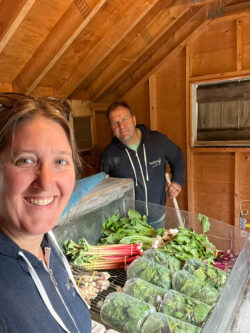
Features
Profiles
Who's Who
Creating community access to food
Tapping into the basics of community-shared agriculture.
May 6, 2024 By Kaitlin Packer
 Josh Oulton and Patricia Bishop farm more than 200 organic acres on two separate farms in Nova Scotia.
Photos courtesy of Patricia Bishop.
Josh Oulton and Patricia Bishop farm more than 200 organic acres on two separate farms in Nova Scotia.
Photos courtesy of Patricia Bishop. More and more consumers are drifting away from locally grown whole foods, opting for nutrition in their drink powders or developing eating patterns based on the latest social media trend. With a growing disconnect between consumers and the source of their food, it’s becoming more important for farmers to remind themselves and their customers about their basic purpose – to grow good food for people.
‘From our hands to your hands’ is the mantra for TapRoot Farms, a diverse farming operation in Port Williams, Nova Scotia. “We want to bring the people into the relationship with food. The people who grow the food, the people who receive the food, the people who eat the food,” says Patricia Bishop, who runs the farm with her husband Josh Oulton. The couple’s vision is to develop a connection between everyone involved in the process while making intentional choices to care for the environment.
Digging up the backstory of TapRoot Farms
Both Bishop’s and Oulton’s agricultural interest developed from their childhood experiences – and culminated in their meeting at the Nova Scotia Agriculture College in Truro. Bishop grew up on a multi-generational farm in Greenwich, N.S., dating back to the 1760s, that mainly produced fruit. Oulton was surrounded by an extended family who farmed in Windsor, N.S. In high school, he worked on a dairy farm, which fueled his desire to have his own operation. “That gave him an [entry] into the agricultural industry through his dairy experience,” says Bishop. “Switching over to vegetable production was a bit of a steep learning curve.”
They purchased a 144-acre vegetable farm in 2004. “We started off growing zucchini, squash and sweet corn for the wholesale market,” says Bishop. As their business expanded in 2007 with the purchase of their 60-acre home farm, their production list grew, too. Now it numbers 20 vegetables, including carrots, cabbage and spinach. They also grow apples, sweet cherries and even cereal grains, which they feed their animals and sell for malt barley.
To keep up with their expanding operation, TapRoot Farms has approximately seven full-time staff and 25 seasonal workers. “Most of those people […] have been coming for years and they’re from Jamaica, and then there’s a very small, little handful of people that come that are local people,” says Bishop. The availability of local staff has been decreasing for years.
Transitioning to organic production
The purchase of the 60-acre home farm, known to be one of the oldest organic farms in Nova Scotia, spurred their transition to organic production. It was a consistent choice with Bishop’s long-held environmental interest and Bachelor of Science studies in college. “I just had my own passion around sorting out how I might be able to contribute to the longevity, the health of the earth and our relationship as humans with it,” says Bishop. “So I personally just really wanted to be farming in a way that was what I believed to be more integrated with the systems of the earth.”

Patricia Bishop and Josh Oulton see their CSA program as an opportunity to connect with and educate their community.
For the first few years, Bishop and Oulton ran the 144-acre vegetable farm and the 60-acre home farm as separate businesses – one with conventional farming practices and one as organic. It wasn’t long before they started seeing the benefits of organic farming on soil health and they transitioned the rest of their vegetables to certified organic production with Ecocert.
As a regenerative farm, their goal is to focus on organic matter by reducing tillage and implementing animal manure, green manure, alfalfa pellets, compost and mulch into their system. “Taking care of the soil is still definitely something we’re working at all the time,” says Bishop. They try to use an eight-year rotation, growing vegetable crops followed by legumes and letting their animals on it for the final two years. “Our animals as part of our rotation is hugely impactful.”
Transplanting their crops has been a key method to manage pests, allowing them to skip out on the vulnerable seeding stage. “You have a much longer period of time where you’re trying to control pests or you’re trying to control weeds or insects that are reducing the resiliency of that little tiny seedling,” says Bishop. Transplanting cuts that time and gives them the chance to prepare the soil properly and transplant a robust seedling into it.
Their goal is to constantly find ways to improve their production while being mindful of the surrounding environment. That’s why they call themselves an agroecological and carbon farming operation. “We work really hard at creating a lot of spaces for trees for buffer zone areas or riparian zone areas to increase diversity and to also be places where carbon can hang out and stay for the long term,” says Bishop. “We are intentionally working to make choices that are reducing the release of carbon and increasing the capacity for it to be held.”

Connecting with community
While their community-shared agriculture (CSA) offering began as a solution for getting their products into the marketplace, it fits well with their farm’s approach to production. CSA is a model that allows customers to buy food directly from the farmer on a regular basis – and Bishop sees it as an opportunity to engage with the community and advance education surrounding food. “All of a sudden, I had this really exciting vision for how our farm could be participating in farming in a way that I believe is better for our planet and, consequently, humans,” she says.
While their CSA offering has evolved over the years, TapRoot Farms typically offers their customers various sizes of a weekly food box from February through December, and a seasonal option from July through December. They also offer 15 to 30 weekly, donation-funded food boxes to families who need it – a program called TapBucks. They try to accommodate different needs by obliging requests for eggs, meat and additional fruit from Bishop’s multi-generational family farm.
Bishop says their goal is to improve people’s access to food, whether they’re growing it for their customers or giving people the opportunity to grow it themselves through one of their sustainable development projects: a TapRoot community garden. “We have a huge problem in our world around access to food because people don’t have access to land,” says Bishop. Now, 10 people have at least one plot to grow their own food in the community garden.
“Philosophically, community-shared agriculture is something that really resonates with people, but in practice it’s really hard in people’s lives,” says Bishop.
People aren’t used to eating whole foods and utilizing vegetables like celery and turnip in January and February. Bishop says they have to work hard at communicating what customers should expect as part of CSA.
Reducing the gap between people and their food is the predominant vision behind many of the projects at TapRoot Farms. Bishop believes that, as a society, we’ve lost sight of what’s most important for us – the things that actually sustain us.
For Bishop, the way forward is simple. “What we do is we grow food,” she says. “Our bodies need nutrition and our earth needs to be taken care of and we need to do that in balance.” •
Print this page